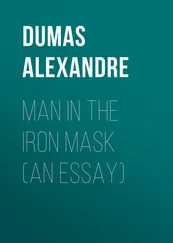George Dover - The True History of the State Prisoner, commonly called the Iron Mask
Здесь есть возможность читать онлайн «George Dover - The True History of the State Prisoner, commonly called the Iron Mask» — ознакомительный отрывок электронной книги совершенно бесплатно, а после прочтения отрывка купить полную версию. В некоторых случаях можно слушать аудио, скачать через торрент в формате fb2 и присутствует краткое содержание. Жанр: foreign_antique, foreign_prose, на английском языке. Описание произведения, (предисловие) а так же отзывы посетителей доступны на портале библиотеки ЛибКат.
- Название:The True History of the State Prisoner, commonly called the Iron Mask
- Автор:
- Жанр:
- Год:неизвестен
- ISBN:нет данных
- Рейтинг книги:5 / 5. Голосов: 1
-
Избранное:Добавить в избранное
- Отзывы:
-
Ваша оценка:
- 100
- 1
- 2
- 3
- 4
- 5
The True History of the State Prisoner, commonly called the Iron Mask: краткое содержание, описание и аннотация
Предлагаем к чтению аннотацию, описание, краткое содержание или предисловие (зависит от того, что написал сам автор книги «The True History of the State Prisoner, commonly called the Iron Mask»). Если вы не нашли необходимую информацию о книге — напишите в комментариях, мы постараемся отыскать её.
The True History of the State Prisoner, commonly called the Iron Mask — читать онлайн ознакомительный отрывок
Ниже представлен текст книги, разбитый по страницам. Система сохранения места последней прочитанной страницы, позволяет с удобством читать онлайн бесплатно книгу «The True History of the State Prisoner, commonly called the Iron Mask», без необходимости каждый раз заново искать на чём Вы остановились. Поставьте закладку, и сможете в любой момент перейти на страницу, на которой закончили чтение.
Интервал:
Закладка:
First Examination of Matthioli.
No. 88. Pomponne to Pinchesne.
No. 89. Pinchesne to Pomponne.
Interviews between the Duke of Mantua and the Senator Foscarini.
No. 90. Louvois to Saint-Mars.
Orders to treat Matthioli with severity.
No. 91. Catinat to Louvois.
Plans of Catinat for obtaining possession of Casale.
No. 92.
Second Examination of Matthioli.
No. 93. Louvois to Saint-Mars.
No. 94. Catinat to Louvois.
Further particulars respecting Matthioli.
No. 95.
Third Examination of Matthioli.
No. 96. Louvois to Saint-Mars.
No. 97. Catinat to Louvois.
Concluding Examination of Matthioli.
No. 98. Varengeville to Pomponne.
Proposed recompense to Giuliani.
No. 99. Louvois to Saint-Mars.
No. 100. Louvois to Saint-Mars.
No. 101. Saint-Mars to Louvois.
No. 102. Saint-Mars to Louvois.
Matthioli complains of his Treatment, and gives Proofs of Insanity.
No. 103. Louvois to Saint-Mars.
No. 104. Louvois to Saint-Mars.
No. 105. Saint-Mars to Louvois.
Matthioli and the Jacobin placed together.
No. 106. Saint-Mars to Louvois.
No. 107. Saint-Mars to Louvois.
Particulars respecting the Ring given by Matthioli to Blainvilliers.
No. 108. Louvois to Saint-Mars.
No. 109. Louvois to Saint-Mars.
No. 110. Louvois to Saint-Mars.
No. 111. Louvois to Saint-Mars.
Appointment of Saint-Mars to the Government of Exiles – Measures to be taken by him thereupon.
No. 112. Louvois to Saint-Mars.
Precautions for the Journey of the Prisoners from Pignerol to Exiles.
No. 113. Louvois to Saint-Mars.
No. 114. Louvois to Saint-Mars.
No. 115. Saint-Mars to Louvois.
Precautions for the Security and Concealment of the Prisoners at Exiles.
No. 116. Louvois to Saint-Mars.
Departure of Saint-Mars from Pignerol ordered to be deferred, in order that he might receive Catinat there.
No. 117. Louvois to Saint-Mars.
No. 118. Louvois to Saint-Mars.
Orders for the Reception of Catinat at Pignerol.
No. 119. Louvois to Saint-Mars.
No. 120. Louvois to Saint-Mars.
No. 121. Saint-Mars to Louvois.
No. 122. Saint-Mars to Louvois.
Description of the Apartment and manner of Confinement of the Prisoners at Exiles.
No. 123. Saint-Mars to Louvois.
No. 124. Saint-Mars to Louvois.
Saint-Mars is made Governor of the Islands of Saint Margaret.
No. 125. Saint-Mars to Louvois.
No. 126. Saint-Mars to Louvois.
Arrival of Matthioli at the Islands of Saint Margaret.
No. 127. Saint-Mars to the Minister.
Relation of the conduct of two Protestant Ministers.
No. 128.
Extract from the Register of the Bastille, published in the Work entitled, “La Bastille Dévoilée”.
No. 129.
Second Extract from the Register of the Bastille, published in the Work entitled, “La Bastille Dévoilée”.
No. 130.
Extract from the Register of Burials of the Church of Saint Paul, at Paris.
No. 131.
Extract from the Work entitled “La Correspondance Interceptée,” by M. Lewis Dutens, published in 1789.
No. 132.
Extract from the article on the Iron Mask in the Work entitled “ Mélanges d’Histoire et de Littérature ;” by Mr. Quintin Craufurd.
No. 133.
Letter from the Baron de Heiss to the Authors of the “ Journal Encyclopédique ” on the subject of the Iron Mask; published in that Journal in 1770.
Letter on the subject of the Man in the Iron Mask, announced in the preceding one.
HISTORY OF THE IRON MASK
The curiosity of the public has been now, for above a century, so much wrought upon by the, mystery which has enveloped the name of the Iron Mask, (or as the French more properly designate him, “ the Man of the Iron Mask ,” 1) that the eagerness for discovery has thus been carried much farther than the real importance of the subject deserved. Numerous have been the papers written, and the conjectures hazarded in favour of different theories; almost all presenting, at first view, some semblance of probability; but all, without exception, crumbling to nothing when exposed to the researches of accurate inquiry. Under these circumstances, it is certainly satisfactory, that the question should be finally set at rest.
It is singular, that among all the inquiries hitherto made respecting the Iron Mask, no one seems ever to have thought of recurring to the only source from whence true information could be derived – the archives of the French Government, during the reign of Lewis the Fourteenth. It was reserved for M. Delort to make these researches; which he did by the permission of the Count d’Hauterive, Keeper of the Archives of the office of Secretary of State for the Foreign department, and the result has been perfectly conclusive. In those archives, he found the continued correspondence of the French ministers, proving, beyond a doubt, that the Iron Mask was an Italian of the name of Matthioli; a personage who was first put on the list of candidates for that honour, in a pamphlet published in 1801, by M. Roux (Fazillac); 2who, however, was then unable to support his opinion with sufficient authorities.
Hercules Anthony Matthioli 3was a Bolognese of ancient family, distinguished in the law. He was the son of Valerian Matthioli and Girolama Maggi, and was born on the 1st of December 1640. On the 13th of January, 1661, he married Camilla, daughter of Bernard Paleotti, and widow of Alexander Piatesi. By her he had two sons, one of whom only had posterity, which has long since been extinct. Early in life he was public reader in the University of Bologna, but he soon quitted his native city to enter into the service of Charles the Third, Duke of Mantua, by whom he was much favoured, and towards the conclusion of whose reign he was made Secretary of State. His successor, Ferdinand, Charles the Fourth, the last sovereign of Mantua, of the house of Gonzaga, created Matthioli Supernumerary Senator of Mantua, an honour which had formerly been enjoyed by his great grandfather, and gave him the title of Count. When he ceased to be Secretary of State at Mantua does not appear; but he was clearly not in that office when he first, unhappily for himself, was involved in diplomatic relations with the agents of the French Government.
Towards the end of the year 1677, the Abbé d’Estrades, 4ambassador from France to the Republic of Venice, conceived the idea, which he was well aware would be highly acceptable to the insatiable ambition of his master, of inducing the Duke of Mantua 5to allow of the introduction of a French garrison into Casale, 6a strongly fortified town, the capital of the Montferrat, and in a great measure the key of Italy. The cession of the fortress of Pignerol 7to the French, by Victor Amadeus, 8Duke of Savoy, in 1632, had opened to them the entry of Piedmont, and the possession of Casale would enable them to invade the Milanese, whenever they were so inclined.
At this time the council of the Duke of Mantua, headed by his mother, 9an Austrian Archduchess, was entirely in the interests of the Court of Spain; while the young Duke, plunged in pleasures and excesses of every kind, took little apparent interest in politicks. The great difficulty, therefore, which Estrades had to encounter in the prosecution of this intrigue, was the establishment of a channel of communication with the Duke; who, as has been stated, was surrounded by persons in the Spanish interest. If he could once enter into secret relations with that Prince, he hoped to be able to bribe him into a concurrence in his designs; for Ferdinand Charles was both needy and unprincipled. He had, besides, discovered, as he writes word to Lewis, in his first letter 10to him, dated Venice, Dec. 18th, 1677, that the Duke was not so abandoned to his pleasures, but that he still had some ambition, and much chagrin at the state of subjection in which he was kept by his mother; joined to a great distrust of the Spaniards, who were supposed to foment the divisions of the Court of Mantua, with the view of, eventually, themselves obtaining possession of Casale and the rest of the Montferrat.
Читать дальшеИнтервал:
Закладка:
Похожие книги на «The True History of the State Prisoner, commonly called the Iron Mask»
Представляем Вашему вниманию похожие книги на «The True History of the State Prisoner, commonly called the Iron Mask» списком для выбора. Мы отобрали схожую по названию и смыслу литературу в надежде предоставить читателям больше вариантов отыскать новые, интересные, ещё непрочитанные произведения.
Обсуждение, отзывы о книге «The True History of the State Prisoner, commonly called the Iron Mask» и просто собственные мнения читателей. Оставьте ваши комментарии, напишите, что Вы думаете о произведении, его смысле или главных героях. Укажите что конкретно понравилось, а что нет, и почему Вы так считаете.












